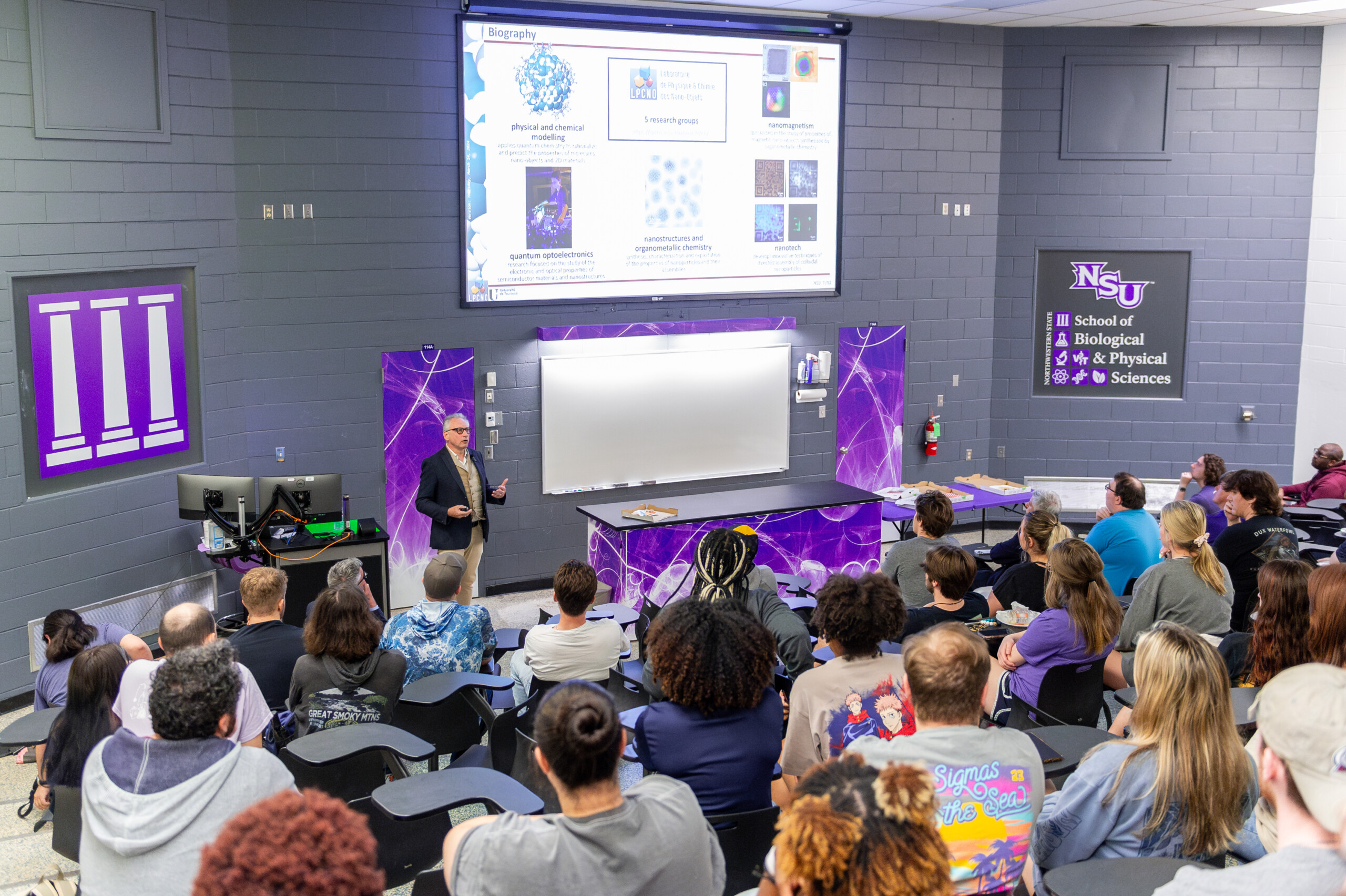NATCHITOCHES – Dr. Romuald Poteau, a professor from Laboratoire de Physique et Chimie des Nano-Objets (LPCNO), INSA-CNRS-UT3, Toulouse, France, spoke to students and faculty in Northwestern State University’s College of Arts and Sciences, the School of STEM and the Department of Physical Science to discuss educational and research collaborations on artificial intelligence and possible student exchanges with Paul Sabatier University, Toulouse.
During his visit, Poteau presented his new research “From density functional theory to artificial intelligence in applied computational chemistry: Hydrogen evolution electroactivity of ultra-small colloidal ruthenium nanoparticles in different environment and prediction of physical properties of solvents.”
In other words, the talk delved into the importance of understanding the behavior of small metal particles, especially in speeding up chemical reactions, a process known as catalysis. Poteau emphasized reliance on computer models to untangle how these particles function.
He illustrated the concept with an example: combining computer simulations and real experiments to predict how efficiently a metal particle can generate hydrogen gas. Additionally, the talk highlighted the challenges in precisely determining why the metal particles behave as they do. Poteau suggested that employing AI could offer a solution for future research, citing a case where AI was used to forecast the viscosity of certain liquids. Overall, Poteau’s talk emphasized the evolving role of computational methods and AI in advancing practices in physical chemistry research.
Dr. Damien Tristant, assistant professor of physics at NSU offered additional insight.
“When understanding the physicochemical properties of materials at a quantum scale, researchers often rely on the density functional theory (DFT) framework. However, these calculations, involving numerous precise parameters, are both time-consuming and memory-intensive,” Tristant explained. “One solution, leveraging AI, entails training a model using data derived from these meticulous calculations. Consequently, this trained AI can further assist in conducting DFT calculations without needing to account for all the accurate parameters, thereby optimizing both time and memory usage while maintaining the same level of precision in the data provided.”
According to Tristant, the potential collaboration paves the way for new horizons, aligning NSU’s future more closely with AI advancements.
“Moreover, it holds the promise of opening new pathways for rural university students with diverse backgrounds, who often lack access to such opportunities,” he added.
Tristant offered another example of using AI in scientific advancement.
“In 1889, Dr. François-Gilbert Viault discovered the body’s capacity to increase red blood cell production as needed. Scientists in the early 1900s postulated the existence of a hormone, erythropoietin, responsible for this process, which was later confirmed after extensive urine filtration. Roughly 50 years later, researchers in Israel identified the rare kidney cell, known as the Norm cell, responsible for producing erythropoietin during low oxygen levels. Remarkably, AI in California independently discovered Norm cells in just six weeks, a feat that took humans 134 years to achieve.
“Nonetheless, this burgeoning technology is still in its infancy and requires thorough comprehension to be effectively applied across various fields,” Tristant said.
Poteaux served as head of a group researching physical and chemical modelization during Tristant’s doctoral studies at LPCNO-Toulouse.
School of STEM Director Dr. Chris Lyles and administrators are interested in the advancing artificial intelligence pathways across the School’s scientific disciplines, which include physics, chemistry, mathematics, engineering technology, veterinary technology, biology and microbiology. Poteau’s group and Paul Sabatier University have already initiated those pathways in Toulouse.
“Our primary objective in partnering with them is to initially train NSU faculty and students in utilizing and advancing this technology, benefiting from their expertise through specialized programs,” Tristant said. “Subsequently, we aim to foster research collaboration and student exchanges between our universities, thereby enhancing the development of AI at NSU and ultimately benefiting Louisiana.”
Information on NSU’s School of STEM can accessed at https://www.nsula.edu/stem/.

